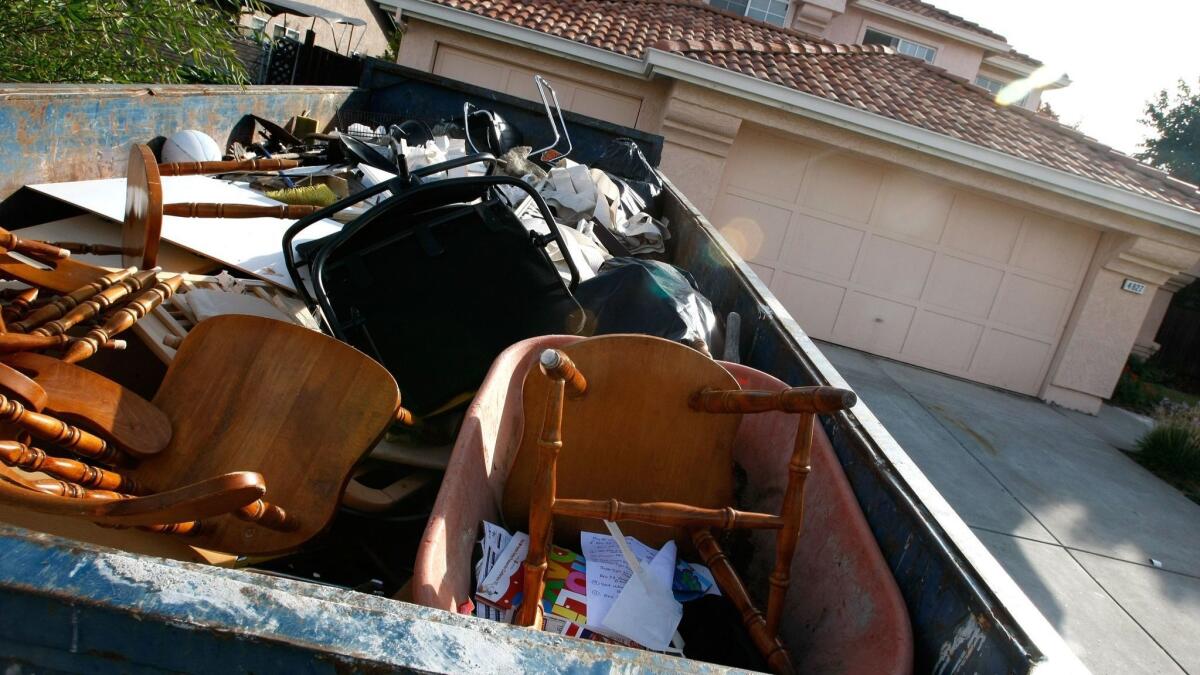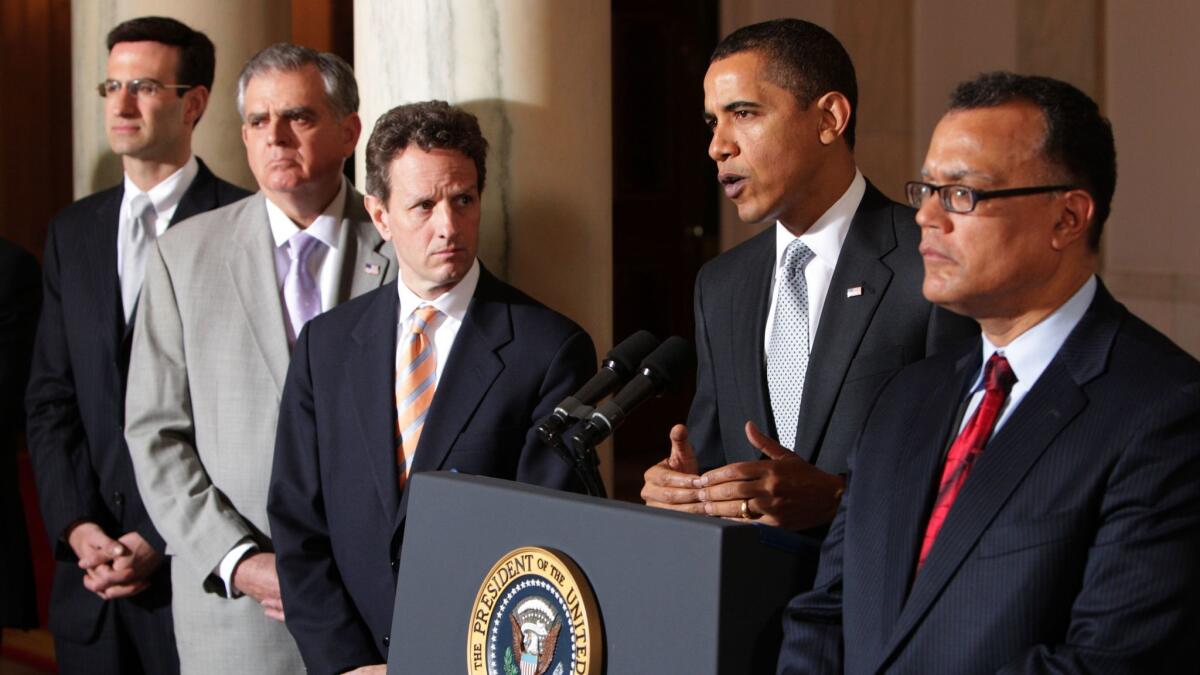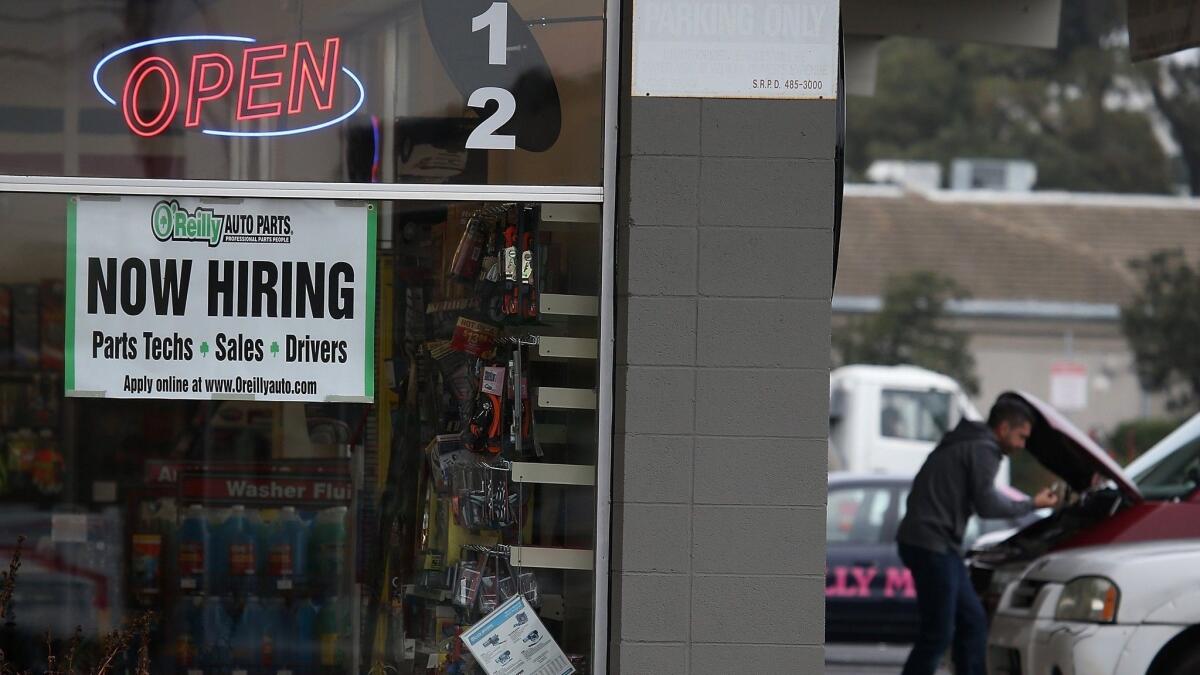To the brink and back: A financial crisis timeline
- Share via

The financial crisis that struck a decade ago had its origins in the easy-to-get mortgages that fueled a housing market bubble beginning in the early 2000s. The crash in home prices when the bubble burst led to a cascade of events that ignited the Great Recession and nearly destroyed the financial system before U.S. officials took controversial steps to prevent an economic meltdown.
Oct. 18, 2006 | Early signs of trouble
The number of Californians sharply behind on their mortgages more than doubles in the third quarter, a new report shows, providing alarming evidence of weakness in the once-booming housing market.

July 24, 2007 | Belongings at the curb
The housing market further sags, forcing Californians out of their homes in record numbers. Foreclosures soar to 17,408 in the three months ended Sept. 30, busting a record set a decade earlier during a severe downturn.
March 16, 2008 | Billions in worthless securities
J.P. Morgan Chase agrees to buy Bear Stearns Co. for a stunningly low $2 a share in a deal backed by emergency Federal Reserve funding to prevent the failure of the 85-year-old investment bank, which was dragged down by billions of dollars of mortgage-backed securities that went bad.
A decade after the financial crisis, many Americans are still struggling to recover »
Sept. 7, 2008 | Uncle Sam takes over mortgage giants
The federal government bails out and takes control of Fannie Mae and Freddie Mac, government-chartered but privately owned firms that reported billions of dollars of losses on some $5 trillion worth of mortgage debt they own or guarantee.

Sept. 15, 2008 | Wall Street giants derailed
Lehman Bros., an aggressive underwriter of mortgage-backed securities, files for bankruptcy protection, and Merrill Lynch agrees to a $50-billion takeover by Bank of America — sending the Dow down 504 points the following Monday, the most since the September 2001 terrorist attacks.
The economy is booming. But are Americans ready for the next recession? »
Have you rebounded? Track the recovery of home prices in Southern California »
Hiltzik: What we learned from the financial crisis — and what we've already forgotten »
Oct. 3, 2008 | Banks get a big handout
Despite strong opposition, the House of Representatives approves a $700-billion fund to save Wall Street firms and other banks, setting in motion the biggest government intervention in the financial system since the Great Depression.

March 30, 2009 | Obama in driver’s seat
President Obama maps out an aggressive plan that ultimately forces struggling automakers General Motors and Chrysler to restructure their businesses and seek bankruptcy protection. GM later emerges a leaner, profitable company while Chrysler is sold to Italian automaker Fiat.
Feb. 13, 2009 | Pumping up the economy
A $787-billion plan to breathe life into the American economy passes the House and Senate. The stimulus ranges from short-term cuts in workers’ withholding taxes to investments in the green economy that may not yield benefits for years.

July 15, 2010 | Taming the wild bull
The Senate passes the wide-ranging Dodd-Frank financial reform bill that gives the government new tools to avoid future corporate bailouts and prevent financial firms from gouging consumers on mortgages and other financial products.
Feb. 9, 2012 | Lending a helping hand
Major banks and state and federal officials reach a $25-billion settlement to help homeowners reduce their mortgage principal or refinance underwater mortgages, though only a fraction goes to foreclosed homeowners.

June 6, 2014 | Help wanted, low pay
The nation finally recovers all 8.7 million jobs lost during the Great Recession. But economists warn that the labor market has failed to keep up with population growth and continues to struggle to create higher-wage jobs.
May 22, 2018 | Dodd-Frank gets tweaked
Bipartisan legislation easing regulations for small and midsize banks passes Congress but falls short of the sweeping roll-back of Dodd-Frank that most Republicans wanted. Community banks that make few mortgages are big beneficiaries.
Inside the business of entertainment
The Wide Shot brings you news, analysis and insights on everything from streaming wars to production — and what it all means for the future.
You may occasionally receive promotional content from the Los Angeles Times.







